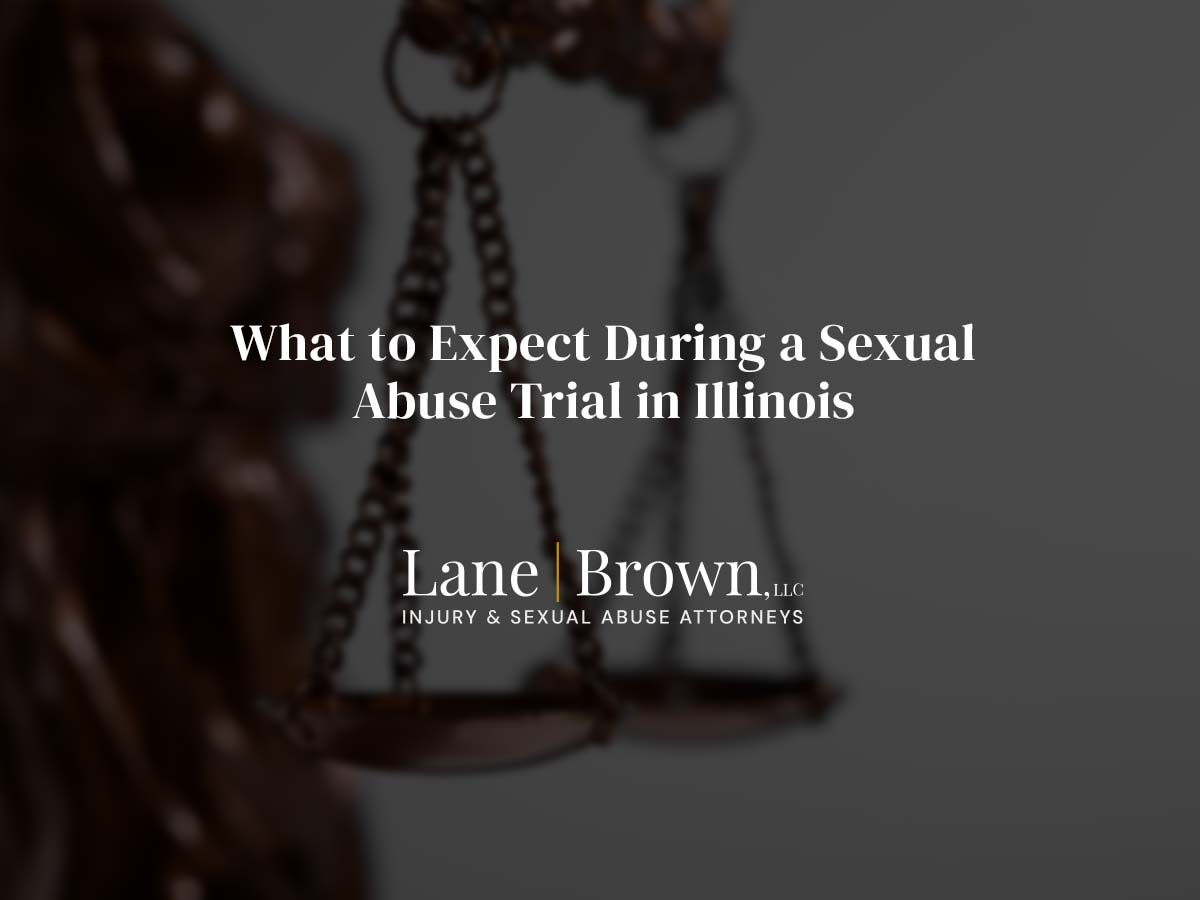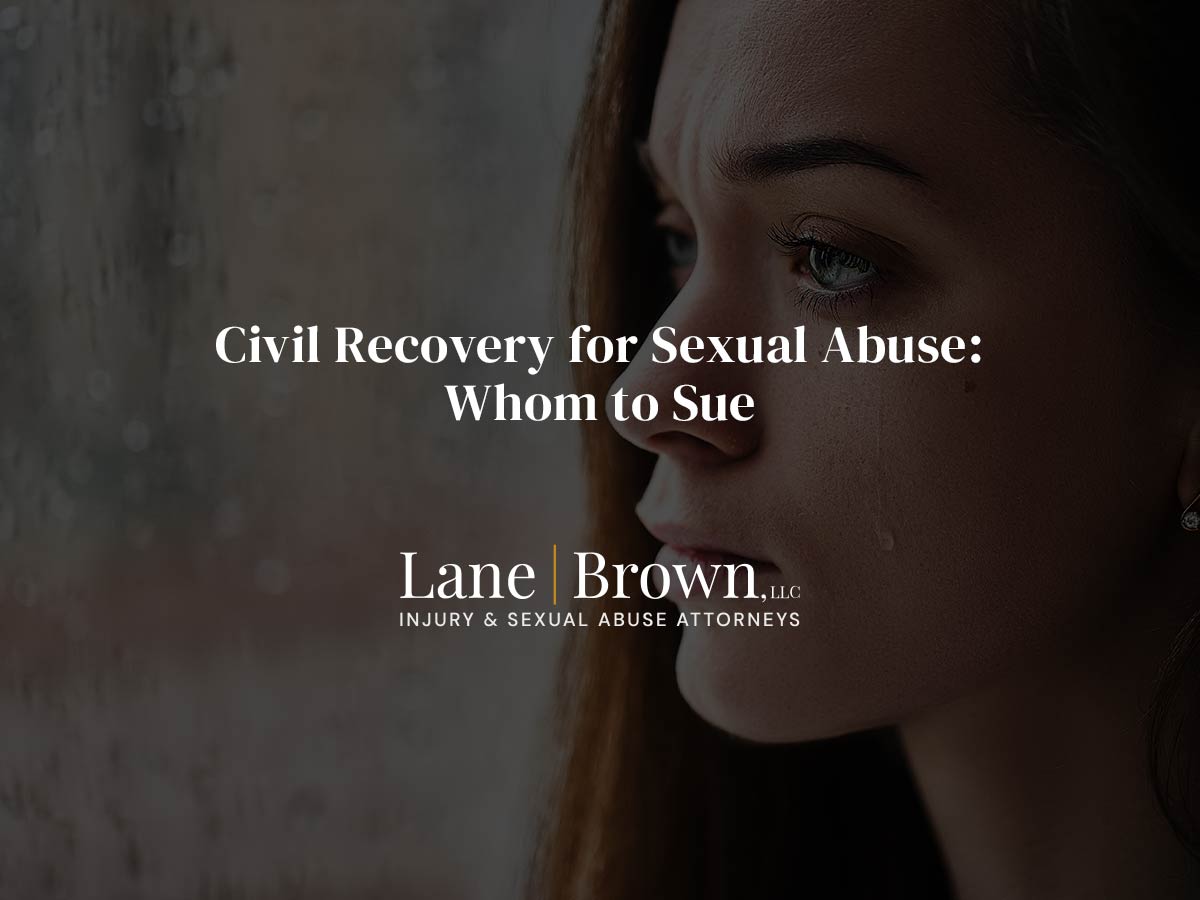Facing the prospect of a sexual abuse trial in Illinois can indeed be an overwhelming experience. The legal terrain is intricate, brimming with unfamiliar terms and intricate procedures that can seem daunting at first glance. However, rest assured that you won’t be alone to navigate this complex journey.
In the following guide, we’re here to provide you with a clear roadmap. Our aim is to demystify the process and shed light on what to anticipate during a sexual abuse trial in Illinois. Our informative journey will simplify complex information, giving you knowledge and understanding in navigating this challenging terrain.
Understanding the Legal Process
The legal process in Illinois for sexual abuse trials can be daunting, but it is essential to understand its complexities. The initial step typically involves reporting the incident to law enforcement or a trusted authority figure.
An investigation then ensues where detectives gather evidence and interview witnesses to establish if there’s sufficient proof to charge the alleged perpetrator under Illinois laws relating to criminal sexual assault or aggravated criminal sexual assault.
Different Stages of a Criminal Trial
A preliminary hearing usually follows this stage. Here, it’s determined whether there’s substantial evidence for continuing case proceedings. If affirmative, charges are formally read during an arraignment session, and pleas entered by defendants. This transitions into the pre-trial motions phase and the discovery period, where the defense attorney and prosecuting attorney exchange information about their respective cases, significantly shaping trial strategies.
Jury Trial vs. Bench Trial
In sex crimes involving serious allegations like child sexual abuse that involve sexual penetration, many opt for bench trials due to potential bias among jurors against such heinous acts of sexual violence. In contrast, some choose a jury trial. The choice between these two largely depends on defendant preferences and specific circumstances surrounding individual cases within the state’s jurisdiction.
Court Proceedings & Roles Involved
During court hearings, regardless of whether a jury trial or bench trial, all parties present arguments before the selected juror panel and presiding judge, respectively. The prosecution presents first, followed by rebuttals from the defense team, who also get the opportunity to cross-examine opposing witnesses, thus impacting final verdicts based on the effectiveness of examinations conducted at this stage.
The penalty for a criminal act depends on how serious the offense is. It can range from a Class 1 felony to a Class 4 felony, according to the Illinois Department of Corrections regulations. These regulations determine the level of seriousness of different types of sexual crimes.
Key Takeaway: In an Illinois sexual abuse trial, the process kicks off with reporting and investigation, followed by a preliminary hearing to determine if there’s enough evidence for proceedings. The case then moves into pre-trial motions and discovery before transitioning to a jury or bench trial based on the defendant’s preference. Court hearings involve arguments from both sides and cross-examinations of witnesses leading up to the verdict.
Preparing for Trial
The prospect of a sexual abuse trial in Illinois can be daunting. It is essential to understand the trial process and how to best equip yourself and your witnesses for it.
Your Role: Testifying Against the Accused
In cases involving criminal sexual violation or aggravated criminal sexual assault, you will likely need to testify about the alleged perpetrator’s actions. Your account forms an integral part of establishing whether any illegal conduct occurred.
A defense attorney may undermine your testimony by pointing out inconsistencies or gaps in your narrative. Working together with the prosecuting attorney beforehand ensures that you are ready for these tactics in the crucial stage of a sex crimes case.
Witness Preparation: Ensuring Credibility
Eyewitnesses present during the incident could also serve as key witnesses during trial proceedings if they provide additional evidence against accused parties supporting allegations of child sexual abuse or other types of serious sex crimes. Prior meetings with legal professionals ensure their testimonies remain credible and consistent under cross-examination from opposing counsel.
Mental Health Support: Coping With Trauma
Telling traumatic experiences like child sexual abuse before strangers inside a courtroom often takes an emotional toll on victims/witnesses alike. It might, therefore, prove beneficial to seek mental health support prior to stepping into court.
Equipping individuals with coping strategies necessary for navigating through the challenging process ensures the best possible outcomes even when facing severe charges like class 1 felony, class 2 felony, and/or class 4 felony.
Evidence Collection
Unveiling the truth in sexual abuse trials often hinges on evidence collection. This crucial stage involves assembling a compelling body of physical, digital, and testimonial proof to present during Illinois court proceedings.
Types of Evidence: From Physical Clues to Digital Trails
Criminal cases around sex crimes like criminal sexual assault or child sexual abuse require diverse evidence. Physical clues can include clothing or bedding containing DNA traces linked with the alleged perpetrator.
In this digital age, electronic trails via text messages, emails, or social media posts indicating inappropriate behavior also form an essential part of the evidentiary puzzle. Beyond tangible objects and online footprints, verbal accounts play a significant role, too. Statements from victims, witnesses, and experts are key components when presenting facts about incidents involving aggravated criminal sexual assault under Illinois law’s hearsay exceptions for child sex crimes.
The Science Behind Presenting Evidence
The prosecuting attorney’s role in any trial, whether a bench trial or a jury trial, is to present proof that the defendant committed acts like criminal sexual conduct. Their goal is to convince the court beyond any reasonable doubt.
Simultaneously, defense attorneys will dissect each piece minutely, aiming at casting doubts over its validity/relevance. Rape kits’ DNA analysis results are potent physical proofs, especially if they involve penetration-related incidents. However, not all sex offenses involve penetration; hence, corroborative testimony becomes invaluable when hard physical evidence lacks presence.
Navigating Admissibility Standards
All pieces presented must meet admissibility standards set forth by Illinois courts based on rules established at both state and federal levels. This ensures only legally obtained information respecting constitutional rights is taken into consideration, or else risk exclusion per Federal Rule 402: General Admissibility Of Relevant Evidence.
Key Takeaway: In an Illinois sexual abuse trial, the importance of evidence can’t be overstated. Each piece plays a pivotal role in painting the full picture, from physical clues to digital trails and testimonies. Yet, presenting it convincingly while navigating admissibility standards is a delicate dance between prosecution and defense attorneys.
Testifying at Trial
Testifying in a sexual violence trial can be intimidating, but with the right preparation and support, it is feasible to successfully traverse this difficult circumstance. The following steps will help you understand what to expect during your testimony.
Tips for Effective Testimony
Your defense attorney is vital in helping you get ready for your time on the stand. They should help you prepare for questions from the judge and the prosecuting attorney. This will ensure that you don’t face any unexpected or uncertain situations when discussing the events of criminal sexual assault or other sex crimes.
Apart from practicing beforehand, another tip includes maintaining eye contact while speaking, which helps build credibility with those present, including jurors who may play a part in determining if the alleged perpetrator would be found guilty under Illinois law.
Navigating Cross-Examination Questions
Cross-examinations are designed by opposing counsel primarily to discredit witnesses’ testimonies, creating doubt about their accounts, especially where cases involve penetration-related allegations such as aggravated criminal sexual assault. If faced with aggressive questioning tactics, don’t panic; remain calm and stick strictly to the facts without embellishment or speculation.
Your Defense Attorney’s Role During Your Testimony
Defense attorneys represent clients facing felony charges, ranging from class 1 to class 4. They also help victims prepare to testify effectively during legal proceedings, such as bench trials, jury trials, or cases in Illinois department-controlled courts. This involves explaining each step of how criminal court procedures work, thus enabling them to focus more on healing rather than stressing over the intricacies of the legal system itself, thereby reducing anxiety associated with the unknowns involved.
Key Takeaway: Testifying in a sexual abuse trial can be overwhelming, but having a defense attorney to guide and prepare you can make it easier. To ace this, you must grasp potential inquiries, make eye contact to appear trustworthy, remain composed when cross-examined, and trust your attorney’s knowledge of Illinois court processes.
Jury Selection
In Illinois, particularly in criminal cases with serious charges such as sexual abuse or aggravated criminal sexual assault, the jury selection process is critical for deciding guilt or innocence. This phase involves picking impartial jurors who will determine the guilt or innocence of an alleged perpetrator.
The Initial Pool of Jurors
The Illinois law enforcement system selects potential jurors from various databases such as voter registration lists and driver’s license records. The aim is to ensure a fair representation of society on juries for sex crimes trials.
These individuals then fill out questionnaires that offer insights into their backgrounds and beliefs. Attorneys use these responses during voir dire–the formal questioning stage–to identify any biases that could influence judgment in sensitive matters such as child sexual abuse.
Voir Dire: A Closer Look
In this part of the jury trial, the prosecutor and defense attorney can question potential jurors about their personal experiences with sex offender cases. They can ask about their knowledge of Illinois law regarding inappropriate sexual conduct.
If either party feels that preconceived notions or bias towards victims or defendants can affect fairness, they may request removal “for cause.” Additionally, each side has peremptory challenges where they can dismiss certain candidates without stating why.
Selecting Final Jury Members
A final panel usually consists of 12 main members and some alternates. The number of alternates depends on whether it is a bench trial (where only the judge decides) or a traditional jury trial (where the jury makes the decision). The goal remains the same: selecting unbiased individuals capable of making fair decisions based solely on the evidence presented at court hearings involving allegations ranging from simple touch-based offenses to more severe forms like class 1 felony offenses.
Closing Arguments
The final stage of a sexual abuse trial in Illinois is the closing arguments. Here, both sides can summarize their case and remind jurors about key evidence, witness testimonies, and how they relate to sex crimes under Illinois law. Understanding this phase can be crucial as it heavily influences the jury’s decision-making process. The order typically starts with the prosecuting attorney, followed by your defense lawyer.
Prosecution’s Final Stand
In criminal cases involving aggravated criminal sexual assault or child sexual abuse, prosecutors will strive to establish guilt beyond reasonable doubt. They may revisit important pieces of evidence, such as physical findings that indicate non-consensual sexual conduct or statements made by alleged perpetrators that suggest inconsistency. This often involves drawing attention to contradicting testimony from witnesses alleging unlawful acts, including those involving sexual penetration without consent.
Your Defense Attorney’s Response
Your defense attorney then has a chance to counteract these allegations put forth by prosecutors during their turn at delivering closing arguments. They have two main tasks here: 1) debunking accusations, and 2) creating doubt among the jurors about whether any illegal actions were committed, especially if the incidents could be considered a violation under class 1, class 2, or even class 4 felony definitions for sex offender laws in Illinois state.
If successful, this could lead to either complete acquittal on charges brought against you or reduced from higher-level felonies into lesser ones carrying less severe penalties upon conviction, potentially mitigating long-term consequences significantly in the post-trial period.
Verdicts & Sentencing in Illinois Sexual Assault Trials
The legal journey of a sexual abuse case culminates with the verdict and sentencing. The decision, reached by jury deliberation or judge’s ruling, establishes whether the defendant is guilty. An acquittal signifies that reasonable doubt led to a not-guilty finding. Sex crimes convictions can range from Class 4 to Class 1 felonies, depending on the severity and circumstances of each case.
Sentencing Hearing Procedures: What Happens Next?
If found guilty during either a bench trial or jury trial at an Illinois Department’s Criminal Court, what follows is known as a sentencing hearing. The prosecuting and defense attorneys present arguments regarding appropriate sentences during this stage. They consider factors such as the nature of the crime (sexual violence), victim impact statements, and any previous convictions of a sex offender, among others.
Appeals & Post-Trial Motions
The conclusion of a sexual violence trial does not necessarily mean the end of legal proceedings in Illinois. Under Illinois law, both parties retain the right to file appeals and post-trial motions.
Navigating Appeals in Sexual Abuse Cases
An appeal is a plea for review by an upper court in the hopes that they may overturn or modify the lower court’s decision. This process typically follows when one party believes there was some error during their criminal trial, such as an incorrect application of laws related to sex crimes like aggravated criminal sexual assault or procedural errors. This statement underscores how crucial timing can be following verdicts involving serious allegations like child sexual assault and other forms of sexual violence within our justice system.
Motions After Trial
Beyond filing an appeal, defendants also have options for submitting post-trial motions, including a motion for a new trial or a motion for judgment notwithstanding the verdict (JNOV). These are generally filed when fresh evidence emerges, which could significantly impact case outcomes–particularly those involving sexual penetration-related offenses where facts were initially overlooked at bench or jury trials for various reasons.
Potential Outcomes Following Appeals & Motions
If successful in appealing the conviction or obtaining a favorable result from a post-trial motion, it could result in a shorter sentence, a new trial, or even being declared not guilty. This depends on the specific circumstances of each case, which can involve charges ranging from a Class 4 felony to a Class 1 felony.
However, unsuccessful attempts might add more time to the original sentence imposed by the judge, so it’s critically important to seek advice from experienced attorneys before proceeding further into this stage.
Our team here at Lane Brown, LLC remains committed to assisting individuals in navigating through the complexities involved while dealing with these sensitive issues amidst the often overwhelming emotions attached to the associated experiences faced by victims throughout statewide jurisdictions across Illinois.
Key Takeaway: In Illinois, a sexual abuse trial’s conclusion doesn’t necessarily mean the end of legal proceedings. Parties can file appeals and post-trial motions if they believe there were errors or new evidence emerges. These steps could lead to sentence reduction, retrial, or acquittal but might extend original sentences if unsuccessful. It’s crucial to seek experienced legal counsel during this complex process.
Resources & Support Services
In the aftermath of a sexual abuse trial in Illinois, victims can access various resources and support services. These range from counseling services to legal aid organizations that assist with civil litigation or criminal prosecution cases related to their experience.
Counseling Services for Healing
The psychological impact of sexual violence often necessitates professional help. RAINN (Rape, Abuse & Incest National Network) provides confidential counseling and crucial resources designed specifically for survivors of such crimes.
Legal Aid: Navigating the Post-Trial Landscape
Beyond emotional recovery, legal guidance is also critical after a trial concludes. For instance, Chicago Volunteer Legal Services (CVLS) offers pro bono representation, particularly beneficial for low-income individuals who need further assistance navigating complex post-trial scenarios, including potential appeals and filing motions.
Victim Compensation Programs: Financial Assistance
Sexual offenses such as aggravated criminal sexual assault and child sexual abuse result in physical and emotional harm and cause financial difficulties for the victims. Compensation programs are important in Illinois law to help cover medical expenses and lost wages resulting from treatment, time off work, and attending court proceedings.
- Victim compensation programs offer financial relief covering costs associated directly with the crime committed against the victim.
- Survivors of crime in Illinois may receive financial assistance for medical expenses, lost wages due to healing or court appearances, and even funeral costs if death results from the incident.
- It is advisable to consult an expert before applying for a victim compensation program, as eligibility requirements may differ.
What to Expect During a Sexual Abuse Trial in Illinois: FAQs
What is the sentence for sexual assault in Illinois?
In Illinois, a conviction for criminal sexual assault can result in 4 to 15 years imprisonment. However, aggravated cases may attract longer sentences.
What is the statute of limitations for sexual abuse in Illinois?
Illinois has no statute of limitations for felony sex offenses committed against minors under 18. For adults, it’s typically within ten years after the victim turns 18.
When investigating a sexual offense, what critical evidence must be established?
Evidence like physical findings, DNA samples, witness testimonies, and potential digital records are crucial when investigating a sexual offense case.
What is the sentence for aggravated criminal sexual abuse in Illinois?
The sentence for aggravated criminal sexual abuse ranges from three to seven years imprisonment but could extend up to fourteen with certain aggravating factors present.
Conclusion
Embarking on the path of navigating a sexual abuse trial in Illinois starts with grasping the intricacies of the legal process. As you prepare for trial, you must arm yourself and your witnesses with knowledge and confidence. Remember that resources are available to support victims throughout their journey towards justice. At Lane Brown, LLC., we specialize in personal injury lawsuits, including serious cases involving sexual abuse. We’re here to guide you through each stage of the process, ensuring you receive fair representation and justice. Contact us today for more information on how we can assist during such challenging times.






